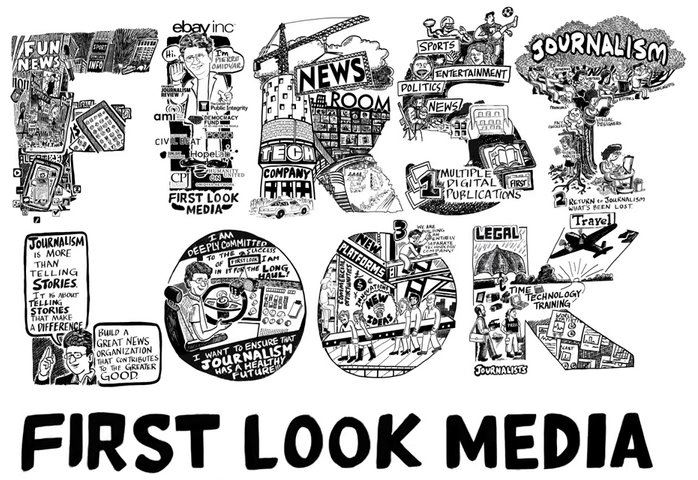
Let’s talk about fraud: “a person or thing intended to deceive others, typically by unjustifiably claiming or being credited with accomplishments or qualities,” the dictionary calls it.
Let’s also discuss breach of contract. “A breach of contract occurs when the promise of the contract is not kept, because one party has failed to fulfill their agreed-upon obligations, according to the terms of the contract. Breaching can occur when one party fails to deliver in the appropriate time frame, does not meet the terms of the agreement, or fails to perform at all,” says a random legal website I googled. Sounds right.
Pierre Omidyar cofounded eBay. He became a billionaire at age 31 when eBay went public. Forbes says he’s now worth $12.8 billion.
As you know, journalism is in trouble. So it sounded almost too good to be true when Omidyar lured Glenn Greenwald, who famously received the Edward Snowden stash of secret documents that proved the U.S. government is spying on us, away from the UK Guardian in order to helm a new, fearless, left-leaning journalism organization by the name of First Look Media.
Best of all, Omidyar promised to fix the biggest problem faced by 21st century journalists: shrinking budgets. First Look Media, Omidyar said, would get a whopping $250 million in order to support “independent journalists in a way that leverages their work to the greatest extent possible, all in support of the public interest.”
Geld macht frei.
Watch this crazy announcement video from 2013. No, really, watch.
First Look Media, Omidyar promises in his video, would feature a “flagship” online magazine—The Intercept, edited by Greenwald—that would “cover news and stories from entertainment and sports to politics and business.” In addition, he pledged, there would be “a family of digital magazines.” (Spoiler: the sports, business and entertainment stuff never materialized.)
One of First Look’s “verticals,” in publishing vernacular, was to be called Racket, “a hard-hitting, satirical magazine in the style of the old Spy” to be edited by Matt Taibbi of Rolling Stone. (Disclosure: I met with Taibbi to discuss the possibility of working for him. Another disclosure: I talked to a reporter at The Intercept about covering my lawsuit against the Los Angeles Times. He was excited but went cold after he pitched it to his editors.)
According to Taibbi and also Greenwald, Taibbi chafed under Omidyar’s incessant micromanaging on everything from whom he could hire to where they would sit. Taibbi quit and returned to Rolling Stone. That was the end of Racket.
Then the fickle billionaire pulled the plug on his other playthings. “Omidyar made clear that there were no plans to launch any more digital magazines in the near term,” Greenwald wrote in 2014. First Look did pick up the cartoon site The Nib in 2016 and added the nonfiction storytelling publication Topic in 2017, only to cancel both and fire their staffs as part of “cost-cutting moves” in 2019.
Omidyar did not explain why an organization backed by a man worth $12.8 billion needs to cut costs, nor how he reconciles his fickleness with that I’ve-got-your-back video. Really, watch it! (To put this in terms a normal person can understand, if you’re worth $500,000, Omidyar’s $250 million pledge is equivalent to $9,000. If you have $500,000 and you can’t spare $9,000 you’re doing something wrong.)
Earlier this year, Omidyar decided to shut down First Look’s maintenance of the Snowden archive. Given that that trove was the company’s original raison d’être, alongside its dedication to investigative journalism, it left loyalists like First Look cofounder Laura Poitras scratching their heads. In March the company laid off its team of researchers.
The point of First Look, remember, was to give good reporters plenty of cash so they could focus on writing and research.
According to Columbia Journalism Review Omidyar has made good on just $90 million of his $250 million commitment. Which is still a lot of money, but it won’t last forever when you’re burning up cash paying exorbitant wages to editors like Greenwald. He collected $1.6 million between 2014 and 2017 while entry-level grunts are making do with $55,000 in a Manhattan where one-bedroom apartments go for $3,500 a month.
Left-leaning journalism types have been whispering about the shenanigans at First Look for years. But few are willing to speak out in public. Omidyar is powerful and wealthy. What if you might want to work for him someday?
Billionaires are purchasing social good will in the hope that they will be “credited with the accomplishments or qualities” of contributing to the “public good,” as Omidyar says in his over-the-top video.
And I’m fine with that—as long as they don’t breach their contract with the public. Omidyar promised us a passel of verticals/online magazines. Where are they? He promised journalists virtually unlimited freedom to investigate, travel, whatever it takes to do their jobs. Budget cuts and mass layoffs are a clear violation of that pledge. He cheated us. He should be held accountable.
Dr. Pat Soon-Shiong is another billionaire, this one from biotech, who has burnished his image as a savior of American journalism by purchasing The Los Angeles Times, the nation’s fourth-largest newspaper. Soon-Shiong is purportedly worth $7.1 billion.
But there’s already a stink, and I’m not talking about the smell of jet fuel raining down on the Times’ new low-budget office building in El Segundo, directly under the flight approach to LAX. The Times previous home was an art deco gem downtown on Times-Mirror Square. Why, one wonders, can’t a man worth $7.1 billion shell out the $50 million-ish cost of a downtown office building rather than move reporters a three-hour drive away from some parts of the city they’re supposed to be covering? (That’s $3,500 for someone worth $500,000.) Why do so many of his new hires skew so young, Millennial and thus so cheaply five-digit?
Despite slavishly sucking up to him in public statements, the union representing Times employees has been rewarded with contempt by Soon-Shiong, who refuses to negotiate in good faith.
Jeff Bezos, self-proclaimed savior of The Washington Post, has a similar attitude toward workers at his newspaper.
I don’t have a problem with derps derping, even when they’re running major news outlets. What seriously pisses me off is when those derps are billionaires who market themselves as saviors to be admired, when they’re anything but.
(Ted Rall (Twitter: @tedrall), the political cartoonist, columnist and graphic novelist, is the author of “Francis: The People’s Pope.” You can support Ted’s hard-hitting political cartoons and columns and see his work first by sponsoring his work on Patreon.)


